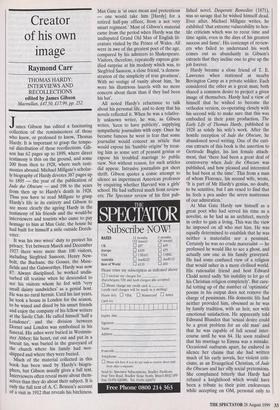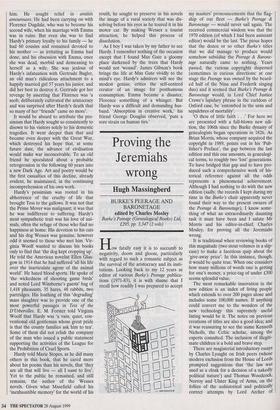Creator of his own image
Raymond Carr
THOMAS HARDY: INTERVIEWS AND RECOLLECTIONS edited by James Gibson Macmillan, £47.50, f17.99, pp. 252 James Gibson has edited a fascinating collection of the reminiscences of those who knew, or professed to know, Thomas Hardy. It is important to grasp the tempo- ral distribution of these recollections. Gib- son has 62 pages up to 1899, where direct testimony is thin on the ground, and some 200 from then to 1928, where such testi- monies abound. Michael Millgate's scholar- ly biography of Hardy devotes 387 pages up to 1895 — the year of the publication of Jude the Obscure — and 198 to the years from then up to Hardy's death in 1928. Thus you have to read Millgate to grasp Hardy's life in its entirety and Gibson to see more clearly the ageing Hardy in the testimony of his friends and the would-be interviewers and tourists who came to pay homage to him at Max Gate, the house he had built for himself a mile outside Dorch- ester.
It was his two wives' duty to protect his privacy. Yet between March and December 1927 there were more than 100 visitors, Including Siegfried Sassoon, Henry New- bolt, the Buchans, the Gosses, the Mase- fields and the Galsworthys. Hardy was now 87. Always disciplined, he worked undis- turbed till teatime when he descended to see his visitors whom he fed with 'very small dainty sandwiches' as a genial host. He was no rural hermit. Until his last years, he took a house in London for the season, to be wined and dined by his smart friends and enjoy the company of his fellow writers at the Savile Club. He called himself 'half a Londoner', and the division between Dorset and London was symbolised in his funeral. His ashes were buried in Westmin- ster Abbey; his heart, cut out and put in a biscuit tin, was buried in the graveyard of the church where his family had wor- shipped and where they were buried. Much of the material collected in this book has been used by Hardy's biogra- phers, but Gibson usually gives a full text. Interviewers often reveal more about them- selves than they do about their subject. It is Only the full text of A. C. Benson's account of a visit in 1912 that reveals his bitchiness. Max Gate is 'at once mean and pretentious — one would take him [Hardy] for a retired half-pay officer, from a not very smart regiment.' Most of Gibson's material came from the period when Hardy was the undisputed Grand Old Man of English lit- erature visited by the Prince of Wales. All were in awe of the greatest poet of the age, compared by his admirers to Shakespeare. Visitors, therefore, repeatedly express grat- ified surprise at his modesty which was, to Siegfried Sassoon, a close friend, 'a demon- stration of the simplicity of true greatness'. With no vestige of vanity about him, 'he wore his illustrious laurels with no more concern about them than if they had been his hat'.
All noted Hardy's reluctance to talk about his personal life, and to deny that his novels reflected it. When he was a relative- ly unknown writer, he was, as Gibson writes, 'keen to have publicity', supplying sympathetic journalists with copy. Once he became famous he went in fear that some journalist would concoct an article that would expose his 'humble origins' by treat- ing him as some sort of peasant genius or expose his troubled marriage to public view. Not without reason, for such articles did appear. Intrusive journalists got short shrift. Gibson quotes a comic attempt to silence an impertinent American professor by enquiring whether Harvard was a girls' school. He had suffered much from review- ers; The Spectator review of his first pub- lished novel, Desperate Remedies (1871), was so savage that he wished himself dead. Ever after, Michael Millgate writes, he exhibited 'that extreme vulnerability to hos- tile criticism which was to recur time and time again, even in the days of his greatest success and fame'. His contempt of review- ers who failed to understand his work comes out so abundantly in Gibson's extracts that they incline one to give up the job forever.
Hardy became a close friend of T. E. Lawrence when stationed at nearby Bovington Camp as a private soldier. Each considered the other as a great man; both shared a common desire to project a given image of themselves. Hardy had a view of himself that he wished to become the orthodox version, co-operating closely with his second wife to make sure that this was embodied in their joint production, The Early Life of Thomas Hardy, published in 1928 as solely his wife's work. After the hostile reception of Jude the Obscure, he abandoned novel writing. One of the curi- ous extracts of this book is the assertion to Gertrude Bugler, his last female attach- ment, that 'there had been a great deal of controversy when Jude the Obscure was published, and how pleased and interested he had been at the time'. This from a man of whom Florence, his second wife, wrote, `It is part of Mr Hardy's genius, no doubt, to be sensitive, but I am vexed to find that he feels a pea under the seven mattresses of our admiration.'
At Max Gate Hardy saw himself as a great poet who had served his time as a novelist, as he had as an architect, merely in order to gain a living. This was the view he imposed on all who met him. He was equally determined to establish that he was neither a materialist nor a pessimist. Certainly he was no crude materialist — he professed he would like to see a ghost, and actually saw one in his family graveyard. He had some confused view of a religion that would usher in a more civilised world. His rationalist friend and host Edward Clodd noted sadly 'his inability to let go of his Christian religion completely'. But care- ful totting up of the number of 'optimistic' poems in his output does not remove the charge of pessimism. His domestic life had neither provided him, obsessed as he was by family tradition, with an heir, nor with emotional satisfaction. He apparently told Edmund Blunden that 'sexual desire could be a great problem for an old man' and that he was capable of full sexual inter- course until he was 84. He soon realised that his marriage to Emma was a mistake. Occasional outbursts apart, he endured in silence her claims that she had written much of his early novels, her violent criti- cisms, as an Evangelical Christian, of Jude the Obscure and her silly social pretensions. She complained bitterly that Hardy had refused a knighthood which would have been a tribute to their joint endeavours while accepting on OM, personal only to him. He sought relief in amities amoureuses. He had been carrying on with Florence Dugdale, who was to become his second wife, when his marriage with Emma was in ruins. But even she was to find Hardy's primary loyalty to his family — he had 60 cousins and remained devoted to his mother — as irritating as Emma had done, and his obsession with Emma, once she was dead, morbid and demeaning to herself as a wife. She was jealous of Hardy's infatuation with Gertrude Bugler, an old man's ridiculous attachment to a happily married girl 57 years his junior, and did her best to destroy it. Gertrude got her revenge by asserting that Florence was 'a snob, deliberately cultivated the aristocracy and was surprised after Hardy's death that so many of her "friends" came no more'.
It would be absurd to attribute the pes- simism that Hardy sought so consistently to disown to his visitors solely to his domestic tragedies. It went deeper than that and became even deeper with the Great War, which destroyed his hope that, at some future date, the advance of civilisation would make war inconceivable. To an old friend he speculated about a probable retrogression in the following 60 years into a new Dark Age. Art and poetry would be the first casualties of this decline, already evident, he maintained, in the continuing incomprehension of his own work.
Hardy's pessimism was rooted in his abhorrence of the cruelty of life that brought Tess to the gallows. It was not that the Prime Mover was malignant; it was that he was indifferent to suffering. Hardy's most sympathetic trait was his love of ani- mals, often the refuge of those who find no happiness at home. His devotion to his cats and his dog Wessex was genuine, however odd it seemed to those who met him. Vir- ginia Woolf wanted to discuss his books only to find that 'the dog kept cropping up'. He told the American novelist Ellen Glas- gow in 1914 that he had suffered 'all his life over the inarticulate agony of the animal world'. He hated blood sports. He spoke of `the wickedness of shooting game birds' and noted Lord Wimborne's guests' bag of 1,418 pheasants, 35 hares, 48 rabbits, two partridges. His loathing of this 'degrading' mass slaughter was to provide one of the most powerful passages in Tess of the D'Urbervilles. E. M. Forster told Virginia Woolf that Hardy was 'a vain, quiet, con- ventional old gentleman whose great pride is that the county families ask him to tea'. Some of them did not relish the company of the man who issued a public statement supporting the activities of the League for the Prohibition of Cruel Sports.
Hardy told Marie Stopes, as he did many others in this book, that he cared more about his poems than his novels, that 'they are all that will live — all I want to live'. Yet to the public he remained, and still remains, the author of the Wessex novels. Given what Masefield called his `inexhaustible memory' for the world of his youth, he sought to preserve in his novels the image of a rural society that was dis- solving before his eyes as he toured it in his motor car. By making Wessex a tourist attraction, he helped this process of dissolution.
As I boy I was taken by my father to see Hardy. I remember nothing of the occasion except that I found Max Gate a gloomy place darkened by the trees that Hardy would not 'wound'. James Gibson's book brings the life at Max Gate vividly to the mind's eye. Hardy's admirers will see the modest genius; critics the self-centred creator of an image for posthumous consumption. Emma became a disaster, Florence something of a whinger. But Hardy was a difficult and demanding hus- band. 'Absorption in creative work,' his friend George Douglas observed, 'puts a sore strain on human ties.'



























































 Previous page
Previous page